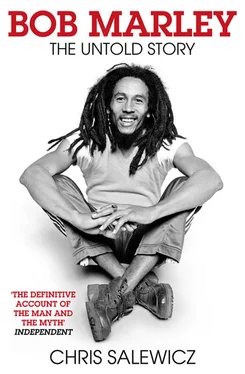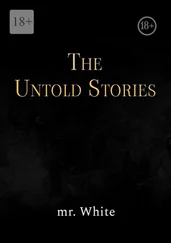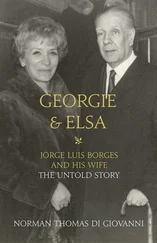In 1972, after ten years in power, the JLP was voted out of office. Michael Manley’s People’s National Party was to run Jamaica for the next eight years. Unfortunately, Manley’s efforts to ally with other socialist Third World countries brought the wrath of the United States upon Jamaica, especially after the prime minister nationalised his country’s bauxite industry, which provides the raw material for aluminium – and had been previously licensed to the Canadian conglomerate Alcan.
A policy of destabilisation began that turned Jamaica into a battleground, especially after Manley was returned to power in December 1976 in the subsequent election. Soon the country was almost bankrupt. Bob Marley played a part in attempting to restore peace, forcing Manley and his opposition rival, Edward Seaga, to shake hands publicly at the 1978 One Love Peace Concert in Kingston, and bringing opposing gunmen together. But the 1980 election, won by Edward Seaga, in power until 1989, was the bloodiest of them all.
In recent years, a measure of peace seems to have been brought to the island. A positive relationship with the nearby United States has been forged, and there is a previously unsurpassed national pride, following the Jamaican soccer team’s qualification for the 1998 World Cup and an unprecedented run of successes at the 2008 Beijing Olympics.
Still, the story of Jamaica is that of an island that can be simultaneously heaven and hell – as indeed described in the Bob Marley song ‘Time Will Tell’, in its line ‘Think you’re in heaven but you’re living in hell’; a country that could suffer the devastating economic bullying of the United States’ Caribbean Basin Initiative during the 1970s but that now, against expectations, is experiencing economic growth and a resultant rise in self-esteem that lets it serve as a model for developing nations in the first years of the twenty-first century. And at least its inhabitants rarely forget that Jamaica is a land whose blessings are surely God-given.
Bob Marley is seen by the world as the personification of the rebellious island nation of Jamaica – not without considerable justification. For Bob Marley was a hero figure, in the classic mythological sense. From immensely humble beginnings, with his talent and religious belief his only weapons, the Jamaican recording artist applied himself with unstinting perseverance to spreading his prophetic musical message; he only departed this planet when he felt his vision of One World, One Love, which was inspired by his belief in Rastafarianism, was beginning in some quarters to be heard and felt. For example, in 1980, the European tour of Bob Marley and the Wailers played to the largest audiences a musical act had ever experienced there. And as much as the late Bob Marley continues to personify Jamaica, so he also embodied the soul of what the world knows as the odd, apparently paradoxical religion of Rastafari, the only faith uncritically accepted globally as an integral aspect of popular music.
Bob Marley’s story is that of an archetype, which is why it continues to have such a powerful and ever-growing resonance: it embodies, among other themes, political repression, metaphysical and artistic insights, gangland warfare, and various periods in a mystical wilderness. It is no surprise that Bob Marley now enjoys an icon-like status more akin to that of the rebel myth of Che Guevara than to that of a pop star. And his audience continues to widen: to westerners, Bob’s apocalyptic truths prove inspirational and life-changing; in the Third World, his impact is similar, except that it goes further. Not just amongst Jamaicans, but also amongst the Hopi people of New Mexico and the Maoris of New Zealand, in Indonesia, in India, even – especially – in those parts of West Africa from which slaves were plucked and taken to the New World, Bob Marley is seen as the Redeemer figure returning to lead this planet out of confusion. Some will come out and say it directly: that Bob Marley is the reincarnation of Jesus Christ long awaited by much of the world. In such an interpretation of his life, the cancer that killed Bob Marley is inevitably described as a modern version of the crucifixion.
Although the disease probably did have its origins in assorted injuries to his right foot, conspiracy theories still persist. Was Bob’s body poisoned still further when going for medical check-ups in Babylonian cities, such as London, Miami, and New York? Were his hotel rooms or homes bombarded with cancer-inducing rays? Or, more simply, was Bob’s system slowly poisoned by the lead from the bullet that remained in his body after the 1976 attempt on his life? (All of these were suggested to me by his mother as possible causes of her son’s death.)
Prior to the US leg of the Uprising tour in the autumn of 1980, Bob Marley had been given a complete physical examination, allegedly passing with flying colours – though this is odd, as the musician was certainly in the latter stages of suffering from cancer. In Miami, before the tour kicked off, he played a game of football for America Jamaica United, against a team of Haitians, in which his fluid skills seemed unabated.
But yes, you think, the cancer probably was the consequence of the injuries to his foot. And then you remember that this was a time when the forces of darkness thought nothing of killing a woman such as Karen Silkwood, who was endeavouring to expose a nuclear risk. How much more must they have been threatened by a charismatic, alternative world leader who in widely accessible popular art was delivering warnings about the wickedness of the world’s institutions?
Thanks to the tireless efforts of Timothy White, the author of Catch a Fire , the wonderful Bob Marley biography published in 1984, the extent of the CIA files on Bob has become widely known. Chris Blackwell, who signed Bob to his Island Records label, had personal experience of this. ‘There are conspiracy theories with everything, especially out of Jamaica, because Jamaicans have such fertile imaginations. The only thing I will say is that I was brought in by the American ambassador in Jamaica to his office, and he said that they were keeping an eye on me, on what I was doing, because I was working with this guy who was capable of de-stabilising. They had their eye on him.’
Bob’s end was very sad. After his collapse whilst jogging in New York’s Central Park on 8 October 1980, he received radiation treatment at the city’s Memorial Sloan-Kettering Cancer Center; his locks fell out, like a portent.
Even confronted by a future of such grim uncertainty, Bob Marley managed never to lose his wry view of life. Two weeks after his collapse, his death was being reported in the US media; he put out a statement in which his characteristic dry sense of humour was clearly still in evidence: ‘They say that living in Manhattan is hell, but …’
With a similar attitude, he strove to make light of his illness to his children. Whilst he was being treated in New York, they flew up from Jamaica to see him at the Essex House hotel on Central Park South, where he habitually stayed when in Manhattan. ‘He told us what was wrong with him,’ said Cedella. ‘His hair was gone. We were like, “Where’s your hair?” He was making it to be such a big joke: “Oh, I’m Frankenstein.” We said, “That’s not funny.”
‘I knew Daddy had a bad toe, because I would have to clean it sometimes. But I just thought it was a bad toe. I didn’t expect anything else but for maybe the nail to come off.’
By November 1980, the doctors at the Sloan-Kettering admitted they could do no more. A number of alternative cures were considered: the apricot kernel therapy attempted by the actor Steve McQueen; a spiritual cure by journeying to Ethiopia; a simple return home to Jamaica – though this plan was abandoned when the island was seen to be in the grip of the most violent general election it had ever known.
Читать дальше












